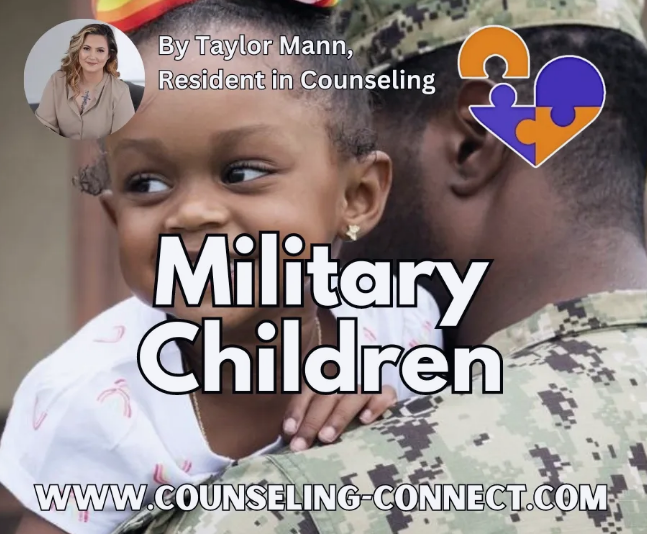By Taylor Mann, Resident in Counseling
April is not only a time for spring showers and blooming flowers but also a month to honor and recognize the resilience and sacrifices of military children. Designated as the Month of the Military Child, April is a time to celebrate and appreciate the unique experiences and challenges faced by children growing up in military families.
Being a military child, often referred to as an “army brat” or “military brat,” comes with a set of distinctive experiences that shape their upbringing in profound ways. From frequent moves to adapting to new schools and communities, military children often navigate a lifestyle characterized by uncertainty and change. These young individuals demonstrate remarkable resilience, courage, and adaptability as they accompany their parents on deployments, relocate across states or countries, and endure long periods of separation from loved ones.
One of the most significant aspects of being an army brat is the constant adjustment and transition. Military families relocate every few years due to new assignments or deployments, which can disrupt established routines and social connections. The transient nature of military life can lead to feelings of isolation, loneliness, and difficulty forming long-lasting friendships. Moreover, the stress of deployments and the absence of a parent can take a toll on the emotional well-being of military children.
Mental health challenges are prevalent among military children, with studies highlighting higher rates of anxiety, depression, and behavioral issues compared to their civilian counterparts. The constant upheaval and uncertainty can contribute to feelings of anxiety and insecurity, making it essential for parents and caregivers to provide consistent support and stability. Additionally, the unique stressors associated with military life, such as worrying about a parent’s safety during deployments or coping with frequent relocations, can exacerbate mental health issues if left unaddressed.
Supporting the mental health and well-being of military children requires a multifaceted approach that involves access to resources, community support, and open communication within the family. Recognizing the signs of distress and providing a safe space for children to express their feelings are crucial steps in promoting resilience and coping skills. Schools, healthcare providers, and military support organizations play a vital role in providing services tailored to the needs of military families, including counseling, peer support groups, and educational programs on resilience and stress management.
As we honor the Month of the Military Child, it’s essential to acknowledge the sacrifices and contributions of these young heroes while raising awareness of the unique challenges they face. By fostering a supportive environment and prioritizing their mental health needs, we can empower military children to thrive despite the challenges of their upbringing. Let us extend our gratitude and admiration to these resilient young individuals who embody the spirit of courage, strength, and resilience in the face of adversity.
https://www.army.mil/article-amp/147786/experts_explain_mental_state_of_military_children

